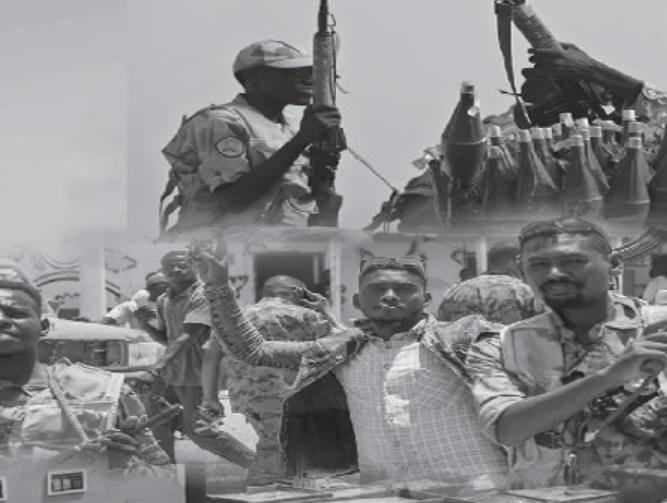Headline
Sudan: Battles Rage On As UN Warns Of ‘Catastrophe’

Fierce fighting between rival generals raged on in Sudan Tuesday despite the latest truce, as warnings multiplied of the potential for a “catastrophic” humanitarian crisis with hundreds of thousands of refugees.
Bloodshed has gripped Sudan since April 15 when tensions erupted into armed exchanges between regular army chief Abdel Fattah al-Burhan and his deputy-turned-rival, Mohamed Daglo, who commands the paramilitary Rapid Support Forces.
Hundreds have been killed and thousands wounded as air strikes and artillery exchanges have gripped swathes of greater Khartoum sparking the exodus of thousands of Sudanese to neighbouring countries.
Many more cannot afford the arduous journey to Sudan’s borders, and have been forced to hole up inside the city of five million people with dwindling supplies of food, water and electricity.
“We are hearing some sporadic gunfire, the roaring of a warplane and the anti-aircraft fire at it,” said one resident of south Khartoum.
READ ALSO: Sudan Crisis: 1,519 Nigerian Students Leave Khartoum For Port Sudan – FG
In a Monday briefing, the top United Nations aid official in Sudan, Abdou Dieng, warned that the situation was turning into “a full-blown catastrophe”.
Kenyan President William Ruto said the conflict had reached “catastrophic levels” with the warring generals declining “to heed the calls by the Inter-Governmental Authority on Development (IGAD), the African Union and the international community to cease fire.”
In a virtual meeting with senior UN officials, Ruto said it was imperative to find ways to provide humanitarian relief “with or without a ceasefire”.
Burhan and Daglo, who fell out after carrying out a 2021 military coup which derailed Sudan’s transition to elective civilian rule, have flouted multiple ceasefires, the latest a 72-hour extension agreed late on Sunday.
Foreign governments have scrambled to evacuate their citizens. Over the past 10 days, thousands of foreigners have been brought to safety by air or sea in operations that are now winding down.
READ ALSO: Sudan Crisis: FG Accused Of ‘Fake’ Evacuation Of Nigerian Students
Russia’s armed forces said on Tuesday they were evacuating more than 200 people from Sudan on four military transport planes.
Nearly 500 people arrived in the Saudi port of Jeddah on Monday aboard two vessels, one a US Navy ship, the other Saudi.
– Relief trickles in –
Top UN humanitarian official Martin Griffiths arrived in Nairobi on Monday on a mission to find ways to bring relief to the millions of civilians trapped inside Sudan.
“The situation unfolding there (in Sudan) since April 15 is catastrophic,” he said on Twitter.
UN warns Sudan at ‘breaking point’ as fresh clashes break out
Sudan’s turmoil has seen hospitals shelled, humanitarian facilities looted and foreign aid groups forced to suspend most of their operations.
READ ALSO: Deadly Fighting Between Army, Paramilitaries In Sudan Capital
At least 528 have been killed and some 4,600 wounded in the violence, according to the health ministry.
The United Nations’ refugee agency, UNHCR, said it was bracing for “the possibility that over 800,000 people may flee the fighting in Sudan for neighbouring countries”.
The World Health Organization warned that the fighting was pushing Sudan’s already ailing health sector toward “disaster” with only 16 percent of health facilities in Khartoum still functioning.
The WHO said that it had delivered six containers of medical equipment to Port Sudan on the Red Sea coast, including supplies for treating trauma injuries and severe acute malnutrition. It had also distributed scarce fuel to hospitals which rely on generators for power.
– Darfur chaos –
Beyond Khartoum, lawlessness has engulfed the West Darfur state capital, El Geneina, where at least 96 people have been reported killed since the start of the fighting, according to UN figures.
READ ALSO: Khartoum, Sudan Sees Lull In Fighting On First Day Of Eid
More than 330,000 people have been displaced, over 70 percent of them in West and South Darfur states, according to the International Organization for Migration.
“The health system has completely collapsed in Geneina,” the doctors’ union said, adding that looting of clinics and camps for the displaced had forced several agencies to carry out “emergency evacuations” for their teams.
On Friday, Doctors Without Borders said the fighting had forced it to halt “almost all activities in West Darfur”.
The Darfur region is still scarred by a war that erupted in 2003 when then hardline president Omar al-Bashir unleashed the Janjaweed militia, mainly recruited from Arab pastoralist tribes, against ethnic-minority rebels.
The scorched-earth campaign left at least 300,000 people dead and close to 2.5 million displaced, according to UN figures.
The Janjaweed — which rights groups have accused of atrocities in Darfur — later evolved into the RSF, which was formally created in 2013.
AFP
Headline
Russia, China Afraid Of US Under My Administration — Trump

United States President, Donald Trump, has said Russia and China fear the United States because of the strength of his administration, arguing that American global influence is driven primarily by its military power and leadership.
Trump, in a post on Truth Social on Wednesday stated that rival powers would not take NATO seriously without the United States, claiming the alliance lacks deterrent force in the absence of American involvement.
He expressed doubts about whether NATO members would come to the aid of the US in a real crisis, despite Washington’s continued commitment to the alliance.
READ ALSO:Trump To Withdraw US From 66 UN, International Organisations
The president credited his leadership with rebuilding the US military during his first term and sustaining its strength, describing this as the key reason adversaries show respect and caution toward the country.
He maintained that America’s military dominance has played a central role in preserving global stability and saving lives.
Trump also argued that his administration forced NATO members to increase defence spending, saying many allies had previously failed to meet financial commitments while relying heavily on the US.
READ ALSO:Insecurity: US Congressman Riley Moore Reveals Trump’s Mission In Nigeria
He added that his actions helped prevent further escalation in Eastern Europe and contributed to the resolution of multiple conflicts.
According to Trump, the United States remains the only nation that commands genuine fear and respect from both Russia and China, a position he attributed to his administration’s approach to defence, diplomacy, and global leadership.
“He wrote partly, “The only Nation that China and Russia fear and respect is the DJT REBUILT U.S.A. MAKE AMERICA GREAT AGAIN!!! President DJT.”
Headline
Trump To Withdraw US From 66 UN, International Organisations

United States President, Donald Trump, has announced plans to withdraw the US from 66 United Nations and international organisations, including key global bodies focused on climate change, peace and democracy.
The decision was disclosed in a presidential memorandum released by the White House on Wednesday evening, following a review of which “organizations, conventions, and treaties are contrary to the interests of the United States.”
According to Trump, the move will see the US end its participation in the affected organisations and cut all related funding.
A list shared by the White House showed that 35 of the organisations are non-UN bodies, including the Intergovernmental Panel on Climate Change (IPCC), the International Institute for Democracy and Electoral Assistance, and the International Union for Conservation of Nature.
READ ALSO:Trump’s Airstrikes: Halt Military Cooperation With US Immediately – Sheikh Gumi Tells Tinubu Govt
Although listed as a non-UN body by the White House, the IPCC is a United Nations organisation that brings together leading scientists to assess climate change evidence and provide periodic reports to guide political leaders.
The memorandum also announced the US withdrawal from 31 UN entities, including the UN Framework Convention on Climate Change (UNFCCC), the UN Democracy Fund, and the UN Population Fund (UNFPA), which focuses on maternal and child health.
Several of the targeted UN bodies are involved in protecting vulnerable groups during armed conflicts, including the UN Office of the Special Representative of the Secretary-General for Children and Armed Conflict.
Reacting to the announcement, UN spokesperson Stephane Dujarric said in a note to correspondents on Wednesday evening that the organisation expected to issue a response by Thursday morning.
Despite repeatedly stating his desire to limit US involvement in UN forums, Trump has continued to exert influence on international decision-making.
READ ALSO:Trump Using FBI To ‘Intimidate’ Congress, US Lawmakers Cry Out
In October last year, he threatened to impose sanctions on diplomats who formally adopted a levy on polluting shipping fuels that had already been agreed to at an earlier meeting, a move that stalled the deal for 12 months.
The Trump administration also sanctioned UN special rapporteur Francesca Albanese after she released a report detailing the role of international and US companies in Israel’s genocidal war on Gaza.
During his first term in 2017, Trump similarly threatened to cut aid to countries that supported a draft UN resolution condemning the US decision to recognise Jerusalem as Israel’s capital.
As a permanent member of the UN Security Council, the US wields significant influence at the United Nations, including veto power, which it has repeatedly used to block efforts to end Israel’s war on Gaza before later mediating a ceasefire.
(Aljazeera)
Headline
UK Supported US Mission To Seize Russian-flagged Oil Tanker – Defense Ministry

The British Ministry of Defence said on Wednesday that it provided support to the United States in its operation to seize a Russian-flagged oil tanker in the North Atlantic.
US seized the tanker, which was being shadowed by a Russian submarine on Wednesday, after pursuing it for more than two weeks across the Atlantic as part of Washington’s efforts to block Venezuelan oil exports.
According to Britain, its armed forces gave pre-planned operational support, including basing following a US request for assistance.
READ ALSO:UK Introduces Powers To Seize Phones, SIM Cards From Illegal Migrants
The UK also said a military vessel provided support for the US forces pursuing the tanker, and the Royal Air Force provided surveillance support from the air.
Defence Secretary John Healey stated that the operation targeted a vessel with a nefarious history linked to Russian and Iranian sanctions evasion networks.
“This action formed part of global efforts to crack down on sanctions busting,” he said in a statement.
READ ALSO:Venezuelan Deportees: US Embassy Gives Reason For Reducing Visa Validity For Nigerians
According to him, the US was Britain’s closest defence and security partner.
“The depth of our defence relationship with the US is an essential part of our security, and today’s seamlessly executed operation shows just how well this works in practice,” he added.
The British government said that the Bella-1 tanker, now renamed Marinera, is sanctioned by the US under its counter-Iran sanctions,
The MoD statement said the support was provided in full compliance with international law.

 News4 days ago
News4 days agoWhat I Saw After A Lady Undressed Herself — Pastor Adeboye

 Headline4 days ago
Headline4 days agoPROPHECY: Primate Ayodele Reveals Trump’s Plot Against Tinubu

 Metro4 days ago
Metro4 days agoArmed Robbers Shot PoS Operator To Death In Edo

 Metro3 days ago
Metro3 days agoAAU Disowns Students Over Protest

 Business3 days ago
Business3 days agoNNPCL Reduces Fuel Price Again

 Metro4 days ago
Metro4 days agoJoint Task Force Kills 23 Bandits Fleeing Kano After Attacks

 Politics4 days ago
Politics4 days ago2027: Rivers APC Pledges To Follow Wike’s Instructions

 Metro3 days ago
Metro3 days agoEdo: Suspected Kidnappers Kill Victim, Hold On To Elder Brother

 Metro3 days ago
Metro3 days agoNine Soldiers Feared Dead In Borno IED Explosion

 Metro4 days ago
Metro4 days agoGunmen Demand N200m Ransom For Kidnapped Brothers In Edo






























